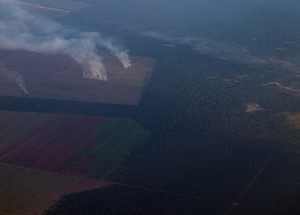Always, in our view, the sides need to come together to strike the right balance between preserving the economy and defending the environment. We applaud the environmental non-profits for coming to the table and negotiating some early steps to bring water stewardship and conservation to farming.
See what you think. Here's the link: http://www.independentsciencenews.org/environment/way-beyond-greenwashing-have-multinationals-captured-big-conservation/
Part of the story:

Jonathan Latham (Photo Credit: auspices)
"Imagine an international mega-deal. The global organic food industry agrees to support international agribusiness in clearing as much tropical rainforest as they want for farming. In return, agribusiness agrees to farm the now-deforested land using organic methods, and the organic industry encourages its supporters to buy the resulting timber and food under the newly devised “Rainforest Plus” label. There would surely be an international outcry.
Virtually unnoticed, however, even by their own memberships, the world’s biggest wildlife conservation groups have agreed exactly to such a scenario, only in reverse. Led by the World Wide Fund for Nature (WWF), many of the biggest conservation nonprofits including Conservation International and the Nature Conservancy have already agreed to a series of global bargains with international agribusiness. In exchange for vague promises of habitat protection, sustainability and social justice, these conservation groups are offering to greenwash industrial commodity agriculture.
The big conservation nonprofits don’t see it that way of course.According to WWF ‘Vice President for Market Transformation’ Jason Clay, the new conservation strategy arose from two fundamental realizations.
The first was that agriculture and food production are the key drivers of almost every environmental concern. From issues as diverse as habitat destruction to over-use of water, from climate change to ocean dead zones, agriculture and food production are globally the primary culprits. To take one example, 80-90% of all fresh water abstracted by humans is for agriculture (e.g. FAO’s State of the World’s Land and Water report ).
This point was emphasized once again in a recent analysis published in the scientific journal Nature. The lead author of this study was Professor Jonathan Foley (Foley et al 2011). Not only is Foley the director of the University of Minnesota-based Institute on the Environment, but he is also a science board member of the Nature Conservancy.
he second crucial realization for WWF was that forest destroyers typically are not peasants with machetes but national and international agribusinesses with bulldozers. It is the latter who deforest tens of thousands of acres at a time. Land clearance on this scale is an ecological disaster, but Claire Robinson of Earth Open Source points out it is also “incredibly socially destructive”, as peasants are driven off their land and communities are destroyed. According to the UN Permanent Forum on Indigenous Issues 60 million people worldwide risk losing their land and means of subsistence from palm plantations.
By about 2004, WWF had come to appreciate the true impacts of industrial agriculture. Instead of informing their membership and initiating protests and boycotts, however, they embarked on a partnership strategy they call ‘market transformation’.
Market Transformation
With WWF leading the way, the conservation nonprofits have negotiated approval schemes for “Responsible” and “Sustainable” farmed commodity crops. According to Clay, the plan is to have agribusinesses sign up to reduce the 4-6 most serious negative impacts of each commodity crop by 70-80%. And if enough growers and suppliers sign up, then the Indonesian rainforests or the Brazilian Cerrado will be saved..."

No comments:
Post a Comment